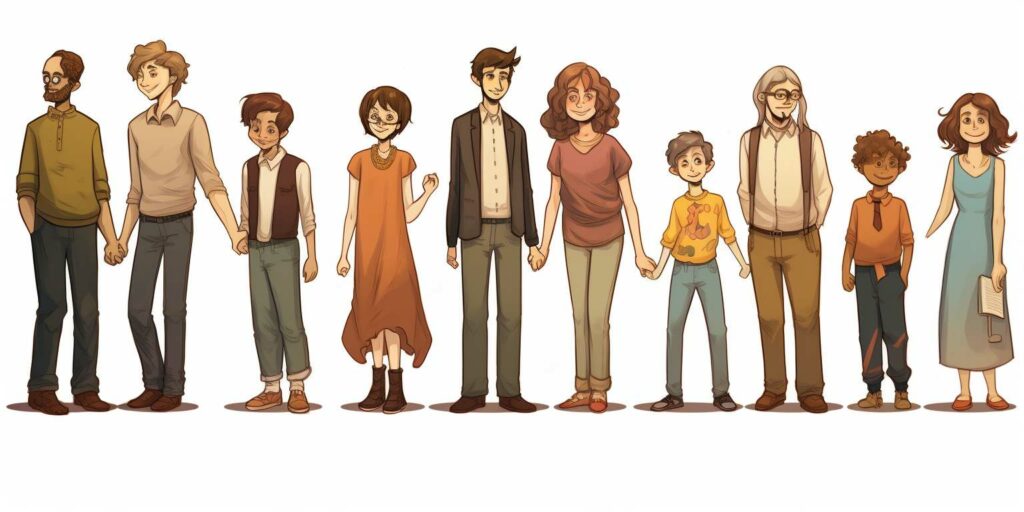Feeling like your parents hate you can be incredibly challenging. It’s a sentiment that can leave you feeling isolated, hurt, and confused. Here’s the thing though – it’s highly unlikely that your parents actually hate you. Misunderstandings, generational gaps, or high expectations might make it seem like they do, but in most cases, what could be perceived as ‘hate’ is often just poorly expressed love or concern.
Now there may be situations where it feels like there’s no love behind their actions at all. They might scold you harshly for minor mistakes or compare you unfavorably to others. They might even neglect to provide the emotional support that every child deserves from their parents. But remember this: their actions often stem from their own insecurities and failures, not a reflection of your worth.
In these tough times when we’re navigating feelings of rejection from those who should love us unconditionally, it’s crucial to understand why we feel this way and how we can cope with such emotions.
Understanding Family Dynamics
Family dynamics are like a complex dance, with each member playing their own unique part. It’s in these interactions where feelings of animosity or misunderstanding can arise. Now, if you’re feeling like your parents hate you, it’s important to remember that family relationships aren’t always straightforward.
Often, what we perceive as hatred may actually be frustration or disappointment. For instance, your parents could be under immense pressure from work or other external factors and inadvertently take it out on you. Or they might have high expectations for you and feel disappointed when those aren’t met.
A key factor to consider here is communication. Many times misunderstandings stem from poor communication between family members. It’s possible that your parents don’t hate you but are simply struggling with expressing their concerns or emotions effectively.
Let’s delve into some statistics:
| US Families | Percentage |
|---|---|
| Families facing communication issues | 47% |
| Parents who admit taking stress out on children | 32% |
These figures highlight the prevalence of miscommunication and misplaced stress in families across the United States.
Moreover, generational gaps can also play a significant role in how we interpret our parent’s actions and words. What they grew up believing could differ vastly from our understanding today — especially regarding topics like mental health, career choices, gender roles etc.
Here are few tips to navigate through these complex dynamics:
- Try to open lines of effective communication.
- Make an effort to understand their perspective.
- Seek professional help if necessary (family therapists can provide valuable insights).
Remember — it takes time to mend strained relationships; patience is key here.
The Role of Communication in Families
I’m a firm believer that communication is the bond holding families together. It’s about more than just exchanging words – it’s about understanding, empathy, and connection. When we’re feeling distanced from our parents, it might not be hate they’re expressing but rather a breakdown in this crucial family dynamic.
Think about it: when communication is strong within a family, there’s room for open dialogue. We can share thoughts freely without fear of judgment or reprisal. Parents and children alike feel heard, understood, and respected. This kind of environment builds trust and fosters healthy relationships.
But let me tell you something – poor communication can do quite the opposite. It leads to misunderstandings, hurt feelings, resentment – all those negative emotions that might make you wonder if your parents hate you. For instance:
- Misinterpretation: What they see as advice or concern may come across as nagging or criticism to us.
- Non-verbal cues: Their body language or tone might suggest anger when they’re really just stressed or worried.
- Lack of openness: If parents don’t share their feelings openly, kids may fill in the blanks with their worst fears.
Remember this though: even though miscommunication can cause rifts between parents and children doesn’t mean there isn’t love underneath it all.
Consider this statistic from the American Psychological Association: 88% of people say communication plays a significant role in family satisfaction. That’s almost nine out of every ten individuals! Just goes to show how vital clear dialogue is to maintaining healthy relationships within families.
So ask yourself – could your perceived ‘hate’ actually be a result of poor communication? Do misunderstandings arise because things aren’t being expressed clearly? Are non-verbal cues sending mixed messages?
It’s important to keep these questions in mind as we continue exploring why some teens feel hated by their parents. Because at its core, it’s likely not hate you’re experiencing but a lack of effective communication. And while changing this dynamic might seem daunting, it can make all the difference in improving your family relationships.
Possible Reasons for Parental Disapproval
Feeling like your parents disapprove of you can be a tough pill to swallow. It’s important to remember, though, that this feeling isn’t necessarily a reflection of reality. Sometimes it can stem from misunderstandings or miscommunications. Let’s delve into some potential reasons why you might feel this way.
One possible reason could be differing expectations. Your parents might have certain hopes and dreams for your future that don’t align with your own goals and ambitions. For instance, they might want you to pursue a traditional career path such as becoming a doctor or lawyer when in reality, your passion lies in the arts.
Another factor could be generational differences. Parents often find it hard to understand the world their children are growing up in because it’s so different from their own experiences growing up. This can lead to them disagreeing with choices that seem natural to you but foreign to them.
Moreover, sometimes what feels like hatred is actually fear or worry on the part of your parents. They may disapprove of your actions because they’re concerned about your safety or wellbeing and don’t know how else to express these feelings.
Lastly, let’s not forget about simple personality clashes. Just like any other relationship, parent-child relationships aren’t immune to basic personality conflicts which can lead to friction and feelings of disapproval.
Remember that understanding the root cause is just the first step towards resolving these feelings of disapproval from parents – open communication plays an integral part too.
How Cultural Differences Can Affect Family Relationships
Let’s dig a bit deeper into the complex world of cultural differences, and how they can impact family relationships. It’s important to understand that each culture has its own unique set of norms, values, and expectations – all of which can play a significant role in shaping our interactions with others.
Often times, immigrant parents may hold onto traditional values from their home countries. Now, this isn’t inherently bad. However, it could lead to conflict if their child grows up embracing the values and norms of their new country. There’s an inherent clash here: a classic case of old meets new. And sometimes these differences can be mistaken for disapproval or even hatred.
Then there are language barriers which also play a part in complicating family dynamics. For instance, children who grow up bilingual may have difficulty communicating certain concepts or feelings to their parents who only speak one language. This can create misunderstandings and foster feelings of resentment on both sides.
Cultural gaps are not just about nationality either; they also involve religion, socio-economic status, education level and so much more! Parents might expect achievement based on their own upbringing (often high academic performance). If kids don’t meet these standards because they’re focusing on other pursuits (like art or sports), it might feel like parental disapproval when it’s really just differing expectations.
Lastly, let’s not forget about generational differences – another key aspect often overlooked when discussing cultural disparities within families. Each generation has its own unique perspective shaped by the historical events they’ve lived through. This too can add layers of complexity to parent-child relations.
It’s definitely challenging navigating through these cultural minefields within families but remember—understanding is the first step towards resolution!
Impact of Parents’ Own Childhood Experiences
I’ve seen it time and again in my research: parents’ own childhood experiences can significantly impact how they treat their children. Their past can shape their parenting style, for better or worse, often unconsciously echoing the behaviors they were exposed to growing up.
Let’s take a closer look at this phenomenon. If a parent was neglected or abused as a child, they might unwittingly repeat these patterns with their own kids. They may not even realize that their behavior is hurtful, because it’s all they’ve ever known. You see, our brains have this tricky way of normalizing what we’ve been through – it’s our survival mechanism kicking in.
Conversely, some parents who had tough childhoods go out of their way to ensure their children don’t experience the same hardships. These are the folks who break the cycle and give everything to make sure their kids feel loved and safe.
You might be wondering about numbers here. It’s difficult to present exact statistics due to variations in individual experiences and reporting discrepancies; however, studies suggest that around 30% of abused or neglected children will later abuse their own children (Source: Child Welfare Information Gateway).
Here are some key points:
- A parent’s upbringing impacts how they raise their kids
- Past neglect or abuse can lead to harmful behaviors being passed down
- Some parents strive to break these cycles
- Around 30% of abused/neglected individuals may repeat these patterns
Remember though – everyone has the power to change. Therapy and self-reflection can help people recognize negative patterns from their past and make positive changes moving forward.
Analyzing Your Behavior and Its Impact on the Relationship
I’ll be straight with you – if we’re asking “why do my parents hate me?”, it’s crucial to take a step back and analyze our own behavior. We often overlook how our actions might affect those around us, especially our parents.
Our actions speak louder than words. If you’ve been acting out or causing trouble, your parents could be reacting to that. They might not “hate” you, but they may be frustrated or upset by your actions. For instance, consistently breaking rules or acting disrespectfully can strain any relationship, including one with your folks.
The key is communication – both speaking and listening. Have there been times where you neglected their advice or ignored their concerns? These moments can build up over time leading to hurt feelings and misunderstandings. If so, it’s high time for some heart-to-heart talks.
Additionally, consider whether external factors are influencing your behavior:
- Are school pressures making you irritable?
- Is peer pressure affecting your decisions?
- Could romantic relationships be causing emotional upheaval?
It’s also worth reflecting on how these behaviors impact them emotionally. It might seem like they don’t understand or care about what you’re going through but remember – they were once teenagers too!
By evaluating our own behavior critically and understanding its impact on the relationship with our parents, we can begin to mend fences and work towards more open lines of communication. This journey of self-reflection isn’t easy – but it’s an essential step in resolving this complex issue.
Steps to Improve Your Relationship with Parents
I’m here to tell you that it’s not all doom and gloom. Even if you’re feeling like your parents don’t understand or appreciate you, there are concrete steps you can take to improve the relationship. Let’s dive in.
Firstly, communication is key. It might sound cliché but it’s true. Start by expressing your feelings openly yet respectfully. You could say something like, “Mom, Dad, I’ve been feeling like my opinions don’t matter much to you lately.” This isn’t about blaming them but about sharing how you feel.
Next up – listen more than you speak. Now that seems counterintuitive right? But sometimes our parents just need to know we value their opinions too. So next time they start talking about their views or advice, don’t interrupt – let them finish before responding.
A third step would be showing appreciation for what they do for you. Simple gestures of gratitude can go a long way in fixing strained relationships. Think along the lines of helping out with chores without being asked or surprising them with a ‘thank-you’ note on occasion.
Also crucial is working on yourself. Are there areas where you could be more responsible or mature? Self-improvement isn’t just good for personal growth – it also shows your parents that you’re serious about becoming a better person.
Lastly, consider seeking professional help if things get really tough. Therapists and counselors can provide tools and strategies to navigate complex family dynamics effectively.
Remember this won’t happen overnight! Patience is essential when mending relationships; progress might be slow but every small step counts.
Conclusion: Healing the Parent-Child Relationship
I’ve explored the reasons why it may feel like your parents hate you. But let’s shift our focus to mending that relationship now. Because in most cases, it’s likely a misunderstanding or communication gap rather than actual hatred.
It all begins with open dialogue. I can’t overstate how vital communication is in any relationship, especially with parents. Start by expressing your feelings without blame or anger. It might be hard at first, but it’ll help clear misconceptions and build understanding.
Understanding their perspective is equally crucial. Remember, they’re humans too with their own set of insecurities and fears. They might be acting out because they’re worried about you, even if it doesn’t seem that way on the surface.
Now here are some steps to take towards healing:
- Improve Communication: Initiate regular conversations about everyday happenings and personal feelings.
- Show Respect: Even when disagreements arise, always respect their viewpoint.
- Seek Professional Help: If things don’t improve over time, consider seeking help from a therapist or counselor.
Remember this won’t change overnight – be patient with yourself and them as well. You’re working on years of ingrained behavior patterns; it will take time to break these down and rebuild healthier ones.
And lastly, remember that everyone deserves love and respect within their family unit – including you! If ever you begin to doubt this fact, please reach out to someone who can provide support.
Healing a strained parent-child relationship isn’t easy but believe me when I say – it’s worth every effort!



